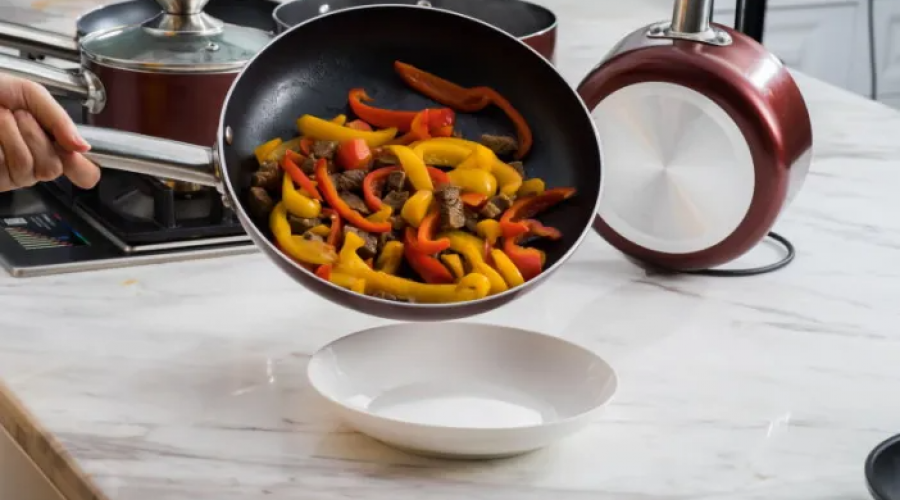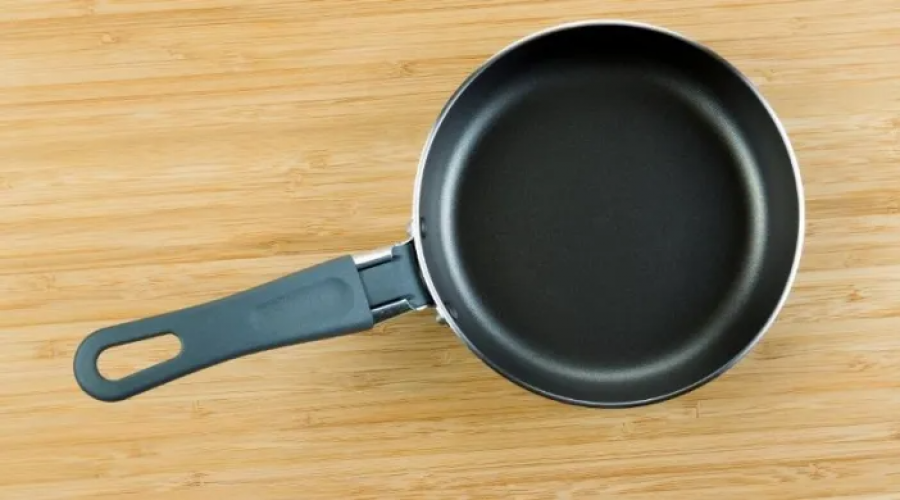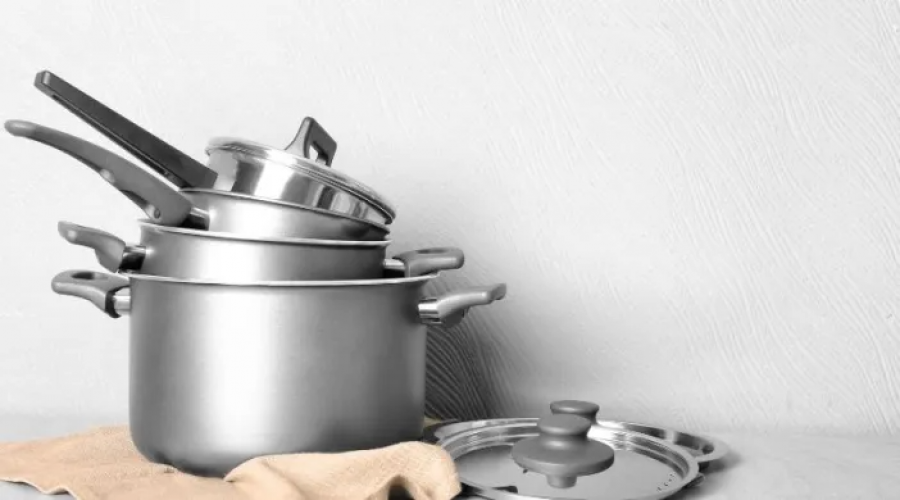Are you new to the world of cooking? Maybe you’re just looking to build your collection of cookware. Either way, you must be considering hard-anodized cookware.
Hard anodized cookware is extremely popular as it’s non-stick, which makes cooking easy. You don’t have to worry about the aluminum coating leaching into your food, as hard anodized aluminum is sealed, which makes this impossible.
As long as you get a set of high-quality anodized cookware with a solid coating, you can cook with peace of mind.
However, when it comes to hard anodized cookware, there are many pros and cons to consider.
This article will cover everything you need to know about anodized cookware, as well as its pros and cons, so you can make an informed purchase!
What Is Anodized Aluminum Cookware?
Just like stainless steel cookware and cast iron, anodized cookware is a popular option for regular cooks. It’s normally made of aluminum, which makes it strong and resistant to rust.
You may be uncertain about using aluminum cookware due to safety reasons. However, hard anodized cookware goes through a special anodization process, which makes it safe and non-toxic.
The aluminum is placed in a sulfuric acid chemical pool. Then, an electric current is passed through, which induces rapid oxidation and creates the anodized material. This is how the cookware is made.
The anodization process creates a material that is hard, durable, and non-stick. This process also makes the aluminum less likely to leach into your food, thus ensuring you’re able to enjoy healthy meals.
While anodized cookware is known to be strong and durable, there are some cons of hard-anodized cookware that you should consider. This will help you weigh the pros and cons and decide if hard anodized cookware is right for you.
Benefits of Hard Anodized Cookware
Non-stick

Hard anodized cookware has a slick surface.
The process of anodizing the aluminum makes the cooking surface smooth. While it’s not perfectly nonstick, food is much less likely to stick on it than other cookware, such as regular aluminum or stainless steel.
This makes cleaning an easy process as well.
You also won’t have to tire yourself with seasoning the cookware to make it non-stick, which is common practice with cast-iron cookware.
Anodized non-stick cookware is also great as it allows you to cook your food uniformly and perfectly achieve the color and flavor you desire.
Strong and Resistant
Not only is the surface of hard anodized cookware non-stick, but it’s also extremely resistant to damage. This means you won’t have to worry about dents and scratches!
The anodization process makes the material very durable. This ensures the cookware will last you for years and make it a worthwhile purchase.
Lightweight
Aluminum is not a heavy metal like cast iron, so hard anodized cookware is pretty lightweight and easy to handle.
Safe and Non-toxic
While leaching is a reasonable worry for some other cookware, the anodization process seals the aluminum to ensure it doesn’t leach or react to acidic foods.
Hard anodized cookware is also safe because it doesn’t contain other harmful toxins such as PFOA chemicals. This ensures it’s non-toxic and safe on every front!
Great Heat Conductivity
Anodized cookware is also known to have excellent thermal conductivity. This means it heats up evenly and quickly. It’s also great for cooking delicate items that need specific levels of doneness, like steak, with amazing results.
Hard aodized cookware also has highly responsive thermal conductivity, meaning it heats up and cools down very quickly. This makes it a great option if you like getting things done quickly.
A Convenient Option
Anodized cookware is a convenient option for many reasons. You can use any type of utensils while cooking with it. This saves you from the hassle of looking for and buying appropriate utensils.
Its non-stick surface also makes cleaning easier, and its resistant body makes it easy to store, as it’s safe from scratches and dents. You can easily stack hard anodized cookware in your cupboard without worrying about damage.
Anodized cookware also has a hard and smooth surface which makes it appropriate to cook most types of food on. You also don’t need to season hard anodized cookware, and can use it straight away after purchasing!
A Healthy Option
Since anodized cookware is non-stick, this means you can easily cook your meals without using too much oil or butter, making your meals healthier and less oily.
This also makes it a great option for people with high cholesterol and those trying to cut back on fat in their food.
Hard-Anodized Cookware Disadvantages

Costly
While hard anodized cookware has many advantages that make it stand out among other types of cookware, it’s also considerably more expensive than non-anodized aluminum cookware.
While prices can vary quite a bit, a high-quality anodized cookware set can cost you upwards of $500.
Not Dishwasher Safe
Hard anodized cookware is easy to clean, but unfortunately not dishwasher-friendly. This means you’ll have to do all the cleaning by hand, and this can often feel like a hassle.
You also have to be extra careful when cleaning anodized cookware. Try not to use harsh chemicals or abrasive sponges.
Heavier Than Aluminum
While anodized cookware is light compared to cast iron and stainless steel, it is considerably heavier than regular aluminum cookware.
This means it may feel bulky if you’re used to normal aluminum cookware.
Inconsistent Quality
Hard anodized cookware is generally strong and durable, but its quality may vary across different brands.
A lot of other factors like weight and thickness can affect the cooking experience provided by anodized cookware. Make sure you buy an anodized cookware set from a trusted brand.
Not Induction-Compatible
Unfortunately, hard anodized cookware is not compatible with induction stovetops. So, if you have an induction cooktop at home, anodized cookware is useless to you and not worth the purchase.
If you need a list of the best induction-compatible cookware, click here.
Heat Risk
While the heat responsiveness of hard anodized cookware is generally an advantage, it poses the issue of overheating which can ruin your cookware over time.
FAQs
Is Hard Anodized Nonstick?
Yes, anodized cookware is non-stick! In fact, this is one of its biggest advantages and what sets it apart from other types of cookware.
The anodization process that makes the aluminum hard also makes it slick. Most hard anodized cookware is also coated with materials such as PTFE which is non-stick.
Sometimes you may even find ceramic non-stick coating on anodized cookware.
Hard anodized cookware is also superior to other non-stick cookware in many ways, because hard-anodized aluminum is stronger, more durable, and a better conductor of heat.
So, when it comes to buying hard anodized cookware, you don’t have to compromise on non-stick quality, as most hard-anodized cookware options are non-stick!
Is Hard Anodized Cookware Dishwasher-Safe?
While hard anodized cookware is generally considered easy to wash, it is unfortunately not dishwasher safe. When it comes to cleaning, dishwashers make the process convenient, but they can be quite harsh on your cookware.
In the case of hard anodized cookware, the harsh chemicals used in a dishwasher can easily ruin the coating on your cookware.
Most anodized cookware comes with an external and internal non-stick coating, and this can be destroyed in the dishwasher.
While this can be a nuisance if you’re used to cleaning with a dishwasher, hard anodized cookware is pretty easy to wash by hand. Just make sure you’re gentle with it!
Don’t use cleaning powders and metal scours, as these can easily ruin the coating on your hard anodized cookware. It’s best to use warm, soapy water and a soft cloth to clean. This ensures the coating on your cookware remains intact.

Is Hard-Anodized Aluminum Safe?
This is a question that often comes up when people are considering buying hard anodized cookware. Normal aluminum cookware can be unsafe because the aluminum often leaches into your food, making it toxic.
However, this problem doesn’t persist with hard-anodized aluminum cookware. The anodization process turns the aluminum hard and essentially seals it so it can’t leach.
It also makes it non-reactive to acidic food, which is usually the cause of metal leaching.
This is a valid concern, as aluminum is known to be extremely toxic for human consumption. Aluminum consumption has been connected to increased chances of certain health problems.
Therefore, it’s imperative to use cookware that doesn’t leach into your food. Thankfully, hard anodized cookware is one such option.
However, while hard anodized aluminum is safe, if your anodized pots and pans have scratches or a ruined coating, this may cause some aluminum to leak. Therefore, take good care of your hard anodized cookware and protect its non-stick coating.
Conclusion
Now that you’ve made it to the end of this article, you know all of the pros and cons of hard anodized cookware and can finally make an informed decision about purchasing it!
We think anodized cookware is a great option if you’re looking for something that is mostly non-stick, sturdy, and durable!
It’s also a safer option compared to non-anodized aluminum cookware.
While anodized cookware can be expensive, it’s also worth it, since it’ll last you years to come and allow you to cook healthy and flavorful food.
However, you should also keep in mind that it’s not dishwasher safe, as this can be a deal-breaker for many who don’t have time for washing by hand.
Weigh the pros and cons of hard anodized cookware as well as your personal needs, and make your choice with confidence!